The Ultimate Guide to Heater Installment for a Cozy Home
Heating system setup is an important facet of keeping a comfortable home environment, especially during the chillier months. Recognizing the various kinds of furnaces readily available and the relevance of selecting the proper dimension can substantially impact both efficiency and convenience levels. In addition, a comprehensive installment procedure, complemented by the right tools and products, makes certain optimal efficiency. This overview aims to gear up property owners with the understanding needed to make educated decisions and execute efficient maintenance practices. As you take into consideration these variables, the inquiry remains: what steps can you take to ensure your furnace serves you well for years to find?
Sorts Of Furnaces

Gas heating systems are the most common selection as a result of their performance and lower functional costs. They utilize natural gas or propane, providing fast heating and consistent performance, making them ideal for colder climates.
Electric heaters, while generally easier to install and preserve, have a tendency to have greater functional prices. They are usually favored in locations where gas solution is inaccessible or for homes with existing electric facilities.
Oil heaters, though much less typical today, remain a viable option in certain regions. They shed home heating oil, which can be useful during cooler months, however their dependence on oil distribution poses prospective difficulties.
In addition, there are high-efficiency models readily available throughout these types, which can dramatically lower energy consumption and energy bills - furnace installation. Ultimately, recognizing these heater kinds will certainly aid homeowners choose a system that aligns with their heating needs, budget plan, and energy choices
Selecting the Right Size
Picking the appropriate size for a heating system is important to ensuring ideal efficiency and power effectiveness. A small heater will certainly have a hard time to maintain comfortable temperature levels during the cold months, leading to enhanced wear and tear, higher energy expenses, and potential system failure. On the other hand, an oversized heater may cycle on and off as well often, causing inefficient heating and uneven temperature level circulation within the home.
To figure out the right furnace dimension, a calculation called the Guidebook J lots calculation should be executed. This process evaluates numerous factors, consisting of the square footage of the home, insulation degrees, window dimensions, and neighborhood climate problems. This extensive analysis ensures that the heating system satisfies the particular heating needs of the room.

Installation Refine Introduction
In regards to products, you will require ductwork, insulation, and sealing tape to make sure ideal airflow and power effectiveness - furnace installation. It is likewise important to have a new furnace filter on hand, in addition to you can find out more venting products, such as PVC pipeline or steel flue, depending on the sort of heater being installed
Safety view it now equipment, including handwear covers, goggles, and a face mask, is also important to shield versus dirt and particles throughout installment. Having all these tools and products conveniently available not only simplifies the process however additionally enhances the safety and security and performance of the heating system installation.
Maintenance Tips for Longevity
To make sure the durability of your heater, it is important to carry out a regular maintenance schedule that deals with vital components of the system. Begin by changing or cleaning up the air filter each to 3 months, as a clogged up filter can restrict air flow and reduce efficiency. In addition, inspect and clean up the blower setting up to prevent dirt build-up that can impede efficiency.
Following, check the thermostat setups and alter if required to ensure exact temperature regulation. Inspect the ductwork for leaks or obstructions, as this can lead to energy loss and irregular home heating. Frequently lube the electric motor and bearings according to the manufacturer's referrals to decrease deterioration.
Expert evaluations must occur annually, where a certified professional can evaluate the heating system's general condition, check for gas leaks, and guarantee that safety and security features are operating properly. Take into consideration mounting a programmable thermostat to optimize energy use and preserve regular home temperature levels. By adopting these maintenance techniques, you can boost your heater's effectiveness, extend its lifespan, and ultimately appreciate a comfortable and comfy home atmosphere.
Verdict
